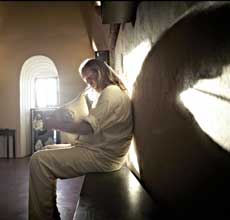Pianist, Arthur Tollefson will join the Beaufort Symphony Orchestra for an All-Mendelssohn program on Thursday, March 1 at 8:00 pm and Sunday, March 4 at 3:00 pm. Both concerts are at USCB’s Center For The Arts, 801 Carteret Street, Beaufort. Individual tickets are $35, but pro-rated subscriptions are still available for the March/May series. Youth through high school may attend for $5.
All ticketing is now being handled through the USCB Box Office . You may call there at 843-521-4145 or visit the box office during regular business hours.
‘Mendelssohn Mania’
Frederick Devyatkin, Musical Director
Overture to ‘A Midsummer Night’s Dream’ – Mendelssohn
Piano Concerto #1 in G Minor – Mendelssohn
Arthur Tollefson, Soloist
Symphony #5, ‘Reformation’ – Mendelssohn
Arthur Tollefson will be at the keyboard with the BSO for Mendelssohn’s Piano Concerto #1 in G Minor. He and Music Director, Frederick Devyatkin have forged a close personal and professional friendship while working together in the past several years. Most recently Tollefson was featured with the orchestra in Gershwin’s ‘Rhapsody in Blue’. Together he and Maestro Devyatkin have appeared in recital numerous times. Mr. Tollefson is also a frequent performer and accompanist at the Sea Island Presbyterian Church’s Chamber Music Series.
Felix Mendelssohn was a prolific composer of symphonies, oratorios, piano literature, and concert pieces. The BSO concert will open with Mendelssohn’s ‘Overture to A Midsummer Night’s Dream’. Maestro Frederick Devyatkin calls Mendelssohn’s lyrical melodies ‘heart stopping’ and considers him a composer of the ‘very first rank’.
Devyatkin has chosen Symphony #5 as part of the BSO’s ‘Mendelssohn Mania’. It is known as ‘The Reformation’, because it was planned for the 300th anniversary of the Augsburg Confession, a central document in the Protestant Reformation. Although it was the second symphony Mendelssohn worked on, it was not published until 21 years later, thus becoming Symphony #5! Along with ‘The Italian’ and ‘The Scottish’, his symphonies are all frequently found on concert programs more than one hundred and fifty years after his death.
At the beginning of the fourth movement, concertgoers may listen for the beloved hymn tune, ‘Ein Feste Burg’ (A Mighty Fortress Is Our God), composed by Martin Luther, and presented in chorale form. It returns in bits and pieces throughout the exposition until the last stirring chords conclude this beautiful work.
Felix Mendelssohn was born in 1809, into a German Jewish family. Both he and his sister, Fanny, showed exceptional musical ability very early in their lives. She was considered to be the more talented, but women were not then encouraged to enter a profession. The Mendelssohn home was a place of intellectual stimulation, as artists, musicians and scholars were frequent visitors. The Mendelssohn children studied art, literature, languages and philosophy.
Felix began performing about the age of nine, and was considered a keyboard prodigy, second only to Mozart! Among his first mature compositions were a String Octet and the Overture to ‘A Midsummer Night’s Dream’, both written when he was 16!
Mendelssohn’s compositions belong to the Early Romantic Period. He acknowledged being greatly influenced by the music of J.S. Bach. He often conducted and performed the music of the great German Classical master, who died in 1750. In fact he is credited with reviving the music of Bach, which had fallen out of fashion.
Mendelssohn’s religious background is somewhat ambiguous. His upbringing was as a protestant, after his Jewish parents converted to Lutheranism and took the surname Bartholdy. Still, his public comments suggest that he seemed to have had great respect for his Jewish roots. Anti-Semitism was a factor in the lives of many Europeans and it was not uncommon to deny one’s Jewish ancestry in order to be personally and professionally accepted.
His piano performances and conducting appearances were generally well received in his German homeland during his lifetime. However, his compositions were considered somewhat old-fashioned, compared to the more Romantic music of Schubert, Liszt and Wagner. Mendelssohn traveled to England more than ten times, performing and conducting his own compositions, where his works were greatly respected and warmly received.
Mendelssohn was married and the father of five children, four of whom lived into adulthood to have successful personal and professional lives. About a year before his death, in 1847, he formed a strong personal bond with Jenny Lind, the supremely gifted soprano famously known ‘The Swedish Nightingale’. She described him as “the only person who brought fulfillment to my spirit”! Although he did not live to hear her performance, it is said that he placed a high F in the aria, ‘Hear, Oh Israel’ from his oratorio, “Elijah” with her voice in mind.
Following his death, she placed a plaque honoring him in Hamburg, Germany, his birthplace. She also established a scholarship for young composers in his name. The first winner of the Mendelssohn Scholarship was Arthur Sullivan, who would later gain lasting fame composing operettas with librettist W. S. Gilbert.
Among Mendelssohn’s other familiar compositions are an orchestral piece known as ‘The Wedding March’ and the music for the Christmas carol, ‘Hark, The Herald Angels Sing’.








